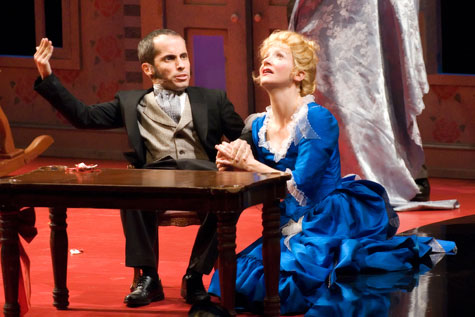
BIG AS LIFE Mabou Mines’ radical reinvention of the Ibsen classic is “metaphorically rendered as a parable of scale.” |
I have been looking forward to this Obie-winning allegory built on Ibsen's A Doll's House since it opened in New York in 2003. And Mabou MinesDollHouse (presented by ArtsEmerson at the Cutler Majestic Theatre through November 6), which has been touring the world for eight years, proves worth the wait. I wouldn't want it to be anyone's first A Doll's House. But for one numbingly familiar with the slammed door that "reverberated across the roof of the world" in 1879, legendary New York-based avant-garde ensemble Mabou Mines' radical reinvention, which turns on a dime from inventive parody to painful feminist triumph, is a revelation.
Adapted by director Lee Breuer and leading actress Maude Mitchell from Ibsen's landmark melodrama, the production begins with happy housewife Nora rushing breathlessly home with a gift for her children: a roofless Victorian dollhouse stocked with diminutive furnishings but big enough for them to play in — and for the play to unfold in. We are told in a director's note that Ibsen's feminism is thus "metaphorically rendered as a parable of scale."
Sure enough, the Victorian men, all played by little people, fit as comfortably into this tiny domestic paradigm as the children do, whereas the show's giddy, mincing, but regulation-size women are cramped and confined. Propelled by Ibsen's overheated plot, Torvald's buttoned-up sexual frenzy, Nora's mounting hysteria, and the music of Edvard Grieg (arranged by Eve Beglarian and played by pianist Susan Tang), the concept-driven work can grow belabored over the course of two and a half hours (whereupon it is necessary to add a few deliberately grotesque sex scenes). But the finale, an emotionally raw mash-up of opera, Wit, and Avenue Q, strips away the irony as surely as the actors do their clothes.
One's concern, before experiencing Breuer's brilliant revisionist cartoon, is that it will prove exploitive of its male cast members. This is offset by the short men's towering investment in their roles. Whereas the women's performances are stylized, exaggerated in both Norwegian-ness and coquetry, the men enact their Victorian upper-handers with touching if tyrannical sincerity. Kristopher Medina (filling in for original Torvald, Mark Povinelli) imbues the smug husband with fierce as well as benign despotism and also captures the clueless bereavement of the man whose caged "skylark" has flown. And Mitchell, having expertly orchestrated Nora's feverish, oft-comical flightiness, piercingly conveys the ravages of closing that dollhouse door. As for Breuer, whatever his height, he's a giant.
Most parents will do anything to help their kids get ahead, further proof of which is supplied by You Better Sit Down: Tales from My Parents' Divorce. Conceived by Jennifer R. Morris, this latest from New York purveyors of "investigative theater" the Civilians immediately preceded DollHouse on the ArtsEmerson dance card (at the Paramount Mainstage, closed). In it, four actors, each seated in a chair from his or her broken-family home, plays one or both of his or her parents, the script taken verbatim from interviews that delved into the parents' marriages and divorces.
This sort of confessional needs to be precisely pulled off to succeed — and so it is, under Anne Kauffman's direction. The four performers portray their diverse parents to a candid, idiosyncratic fare-thee-well, and the staging incorporates tension-relieving breaks in which tea is procured or a phone answered. The show is certainly engaging — who knew divorce could be so hilarious? But unlike In the Footprint: The Battle Over Atlantic Yards, the exploration of community divisiveness and urban renewal that the troupe performed here last year, You Better Sit Down doesn't leap from its disarming specifics to deeper insights. File under Anna Deavere Smith Lite.